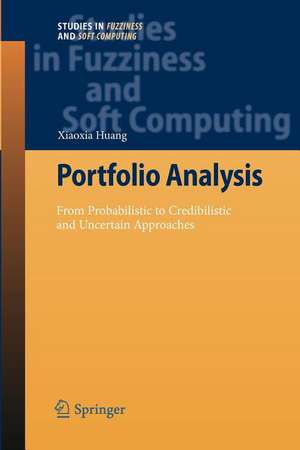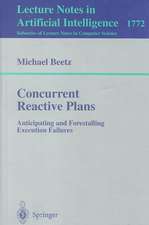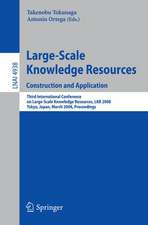Portfolio Analysis: From Probabilistic to Credibilistic and Uncertain Approaches: Studies in Fuzziness and Soft Computing, cartea 250
Autor Xiaoxia Huangen Limba Engleză Paperback – 4 mai 2012
| Toate formatele și edițiile | Preț | Express |
|---|---|---|
| Paperback (1) | 640.19 lei 6-8 săpt. | |
| Springer Berlin, Heidelberg – 4 mai 2012 | 640.19 lei 6-8 săpt. | |
| Hardback (1) | 646.62 lei 6-8 săpt. | |
| Springer Berlin, Heidelberg – 18 feb 2010 | 646.62 lei 6-8 săpt. |
Din seria Studies in Fuzziness and Soft Computing
- 20%
 Preț: 999.85 lei
Preț: 999.85 lei - 20%
 Preț: 653.06 lei
Preț: 653.06 lei - 20%
 Preț: 872.96 lei
Preț: 872.96 lei - 20%
 Preț: 930.57 lei
Preț: 930.57 lei - 20%
 Preț: 1051.00 lei
Preț: 1051.00 lei - 20%
 Preț: 992.44 lei
Preț: 992.44 lei - 20%
 Preț: 655.85 lei
Preț: 655.85 lei - 20%
 Preț: 1001.86 lei
Preț: 1001.86 lei - 18%
 Preț: 954.14 lei
Preț: 954.14 lei - 20%
 Preț: 330.10 lei
Preț: 330.10 lei - 20%
 Preț: 333.04 lei
Preț: 333.04 lei - 20%
 Preț: 997.56 lei
Preț: 997.56 lei -
 Preț: 391.61 lei
Preț: 391.61 lei - 20%
 Preț: 647.79 lei
Preț: 647.79 lei - 20%
 Preț: 986.01 lei
Preț: 986.01 lei - 18%
 Preț: 958.56 lei
Preț: 958.56 lei - 20%
 Preț: 996.40 lei
Preț: 996.40 lei - 20%
 Preț: 999.35 lei
Preț: 999.35 lei - 15%
 Preț: 646.43 lei
Preț: 646.43 lei - 20%
 Preț: 651.57 lei
Preț: 651.57 lei - 20%
 Preț: 997.89 lei
Preț: 997.89 lei - 15%
 Preț: 641.03 lei
Preț: 641.03 lei - 20%
 Preț: 1009.74 lei
Preț: 1009.74 lei - 20%
 Preț: 992.62 lei
Preț: 992.62 lei -
 Preț: 388.72 lei
Preț: 388.72 lei - 18%
 Preț: 1223.43 lei
Preț: 1223.43 lei - 20%
 Preț: 651.42 lei
Preț: 651.42 lei - 18%
 Preț: 951.59 lei
Preț: 951.59 lei - 18%
 Preț: 948.61 lei
Preț: 948.61 lei
Preț: 640.19 lei
Preț vechi: 800.23 lei
-20% Nou
Puncte Express: 960
Preț estimativ în valută:
122.50€ • 128.24$ • 101.36£
122.50€ • 128.24$ • 101.36£
Carte tipărită la comandă
Livrare economică 05-19 aprilie
Preluare comenzi: 021 569.72.76
Specificații
ISBN-13: 9783642262494
ISBN-10: 364226249X
Pagini: 192
Ilustrații: X, 182 p. 51 illus.
Dimensiuni: 155 x 235 x 10 mm
Greutate: 0.27 kg
Ediția:2010
Editura: Springer Berlin, Heidelberg
Colecția Springer
Seria Studies in Fuzziness and Soft Computing
Locul publicării:Berlin, Heidelberg, Germany
ISBN-10: 364226249X
Pagini: 192
Ilustrații: X, 182 p. 51 illus.
Dimensiuni: 155 x 235 x 10 mm
Greutate: 0.27 kg
Ediția:2010
Editura: Springer Berlin, Heidelberg
Colecția Springer
Seria Studies in Fuzziness and Soft Computing
Locul publicării:Berlin, Heidelberg, Germany
Public țintă
ResearchCuprins
What Is Portfolio Analysis.- Probabilistic Portfolio Selection.- Credibilistic Portfolio Selection.- Uncertain Portfolio Selection.- Model Varieties.
Textul de pe ultima copertă
The most salient feature of security returns is uncertainty. The purpose of the book is to provide systematically a quantitative method for analyzing return and risk of a portfolio investment in different kinds of uncertainty and present the ways for striking a balance between investment return and risk such that an optimal portfolio can be obtained.
In classical portfolio theory, security returns were assumed to be random variables, and probability theory was the main mathematical tool for handling uncertainty in the past. However, the world is complex and uncertainty is varied. Randomness is not the only type of uncertainty in reality, especially when human factors are included. Security market, one of the most complex markets in the world, contains almost all kinds of uncertainty. The security returns are sensitive to various factors including economic, social, political and very importantly, people’s psychological factors. Therefore, other than strict probability method, scholars have proposed some other approaches including imprecise probability, possibility, and interval set methods, etc., to deal with uncertainty in portfolio selection since 1990s. In this book, we want to add to the tools existing in science some new and unorthodox approaches for analyzing uncertainty of portfolio returns. When security returns are fuzzy, we use credibility which has self-duality property as the basic measure and employ credibility theory to help make selection decision such that the decision result will be consistent with the laws of contradiction and excluded middle. Being aware that one tool is not enough for solving complex practical problems, we further employ uncertain measure and uncertainty theory to help select an optimal portfolio when security returns behave neither randomly nor fuzzily.
In classical portfolio theory, security returns were assumed to be random variables, and probability theory was the main mathematical tool for handling uncertainty in the past. However, the world is complex and uncertainty is varied. Randomness is not the only type of uncertainty in reality, especially when human factors are included. Security market, one of the most complex markets in the world, contains almost all kinds of uncertainty. The security returns are sensitive to various factors including economic, social, political and very importantly, people’s psychological factors. Therefore, other than strict probability method, scholars have proposed some other approaches including imprecise probability, possibility, and interval set methods, etc., to deal with uncertainty in portfolio selection since 1990s. In this book, we want to add to the tools existing in science some new and unorthodox approaches for analyzing uncertainty of portfolio returns. When security returns are fuzzy, we use credibility which has self-duality property as the basic measure and employ credibility theory to help make selection decision such that the decision result will be consistent with the laws of contradiction and excluded middle. Being aware that one tool is not enough for solving complex practical problems, we further employ uncertain measure and uncertainty theory to help select an optimal portfolio when security returns behave neither randomly nor fuzzily.
Caracteristici
Recent research results on portfolio analysis The State of the art of uncertainty methods – from probabilistic to credibilistic


















